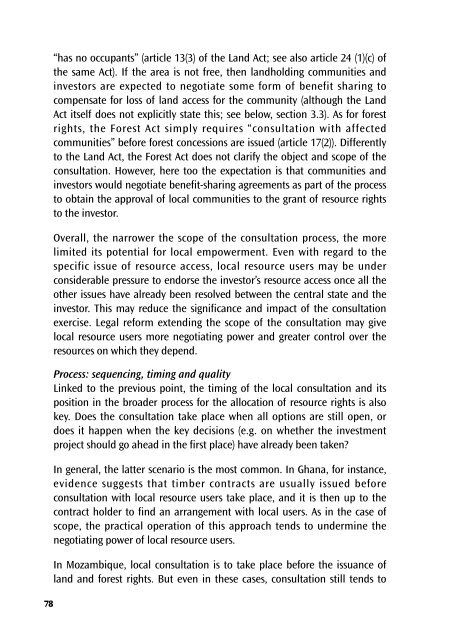Legal empowerment for local resource control
Legal empowerment for local resource control
Legal empowerment for local resource control
Create successful ePaper yourself
Turn your PDF publications into a flip-book with our unique Google optimized e-Paper software.
78<br />
“has no occupants” (article 13(3) of the Land Act; see also article 24 (1)(c) of<br />
the same Act). If the area is not free, then landholding communities and<br />
investors are expected to negotiate some <strong>for</strong>m of benefit sharing to<br />
compensate <strong>for</strong> loss of land access <strong>for</strong> the community (although the Land<br />
Act itself does not explicitly state this; see below, section 3.3). As <strong>for</strong> <strong>for</strong>est<br />
rights, the Forest Act simply requires “consultation with affected<br />
communities” be<strong>for</strong>e <strong>for</strong>est concessions are issued (article 17(2)). Differently<br />
to the Land Act, the Forest Act does not clarify the object and scope of the<br />
consultation. However, here too the expectation is that communities and<br />
investors would negotiate benefit-sharing agreements as part of the process<br />
to obtain the approval of <strong>local</strong> communities to the grant of <strong>resource</strong> rights<br />
to the investor.<br />
Overall, the narrower the scope of the consultation process, the more<br />
limited its potential <strong>for</strong> <strong>local</strong> <strong>empowerment</strong>. Even with regard to the<br />
specific issue of <strong>resource</strong> access, <strong>local</strong> <strong>resource</strong> users may be under<br />
considerable pressure to endorse the investor’s <strong>resource</strong> access once all the<br />
other issues have already been resolved between the central state and the<br />
investor. This may reduce the significance and impact of the consultation<br />
exercise. <strong>Legal</strong> re<strong>for</strong>m extending the scope of the consultation may give<br />
<strong>local</strong> <strong>resource</strong> users more negotiating power and greater <strong>control</strong> over the<br />
<strong>resource</strong>s on which they depend.<br />
Process: sequencing, timing and quality<br />
Linked to the previous point, the timing of the <strong>local</strong> consultation and its<br />
position in the broader process <strong>for</strong> the allocation of <strong>resource</strong> rights is also<br />
key. Does the consultation take place when all options are still open, or<br />
does it happen when the key decisions (e.g. on whether the investment<br />
project should go ahead in the first place) have already been taken?<br />
In general, the latter scenario is the most common. In Ghana, <strong>for</strong> instance,<br />
evidence suggests that timber contracts are usually issued be<strong>for</strong>e<br />
consultation with <strong>local</strong> <strong>resource</strong> users take place, and it is then up to the<br />
contract holder to find an arrangement with <strong>local</strong> users. As in the case of<br />
scope, the practical operation of this approach tends to undermine the<br />
negotiating power of <strong>local</strong> <strong>resource</strong> users.<br />
In Mozambique, <strong>local</strong> consultation is to take place be<strong>for</strong>e the issuance of<br />
land and <strong>for</strong>est rights. But even in these cases, consultation still tends to

















